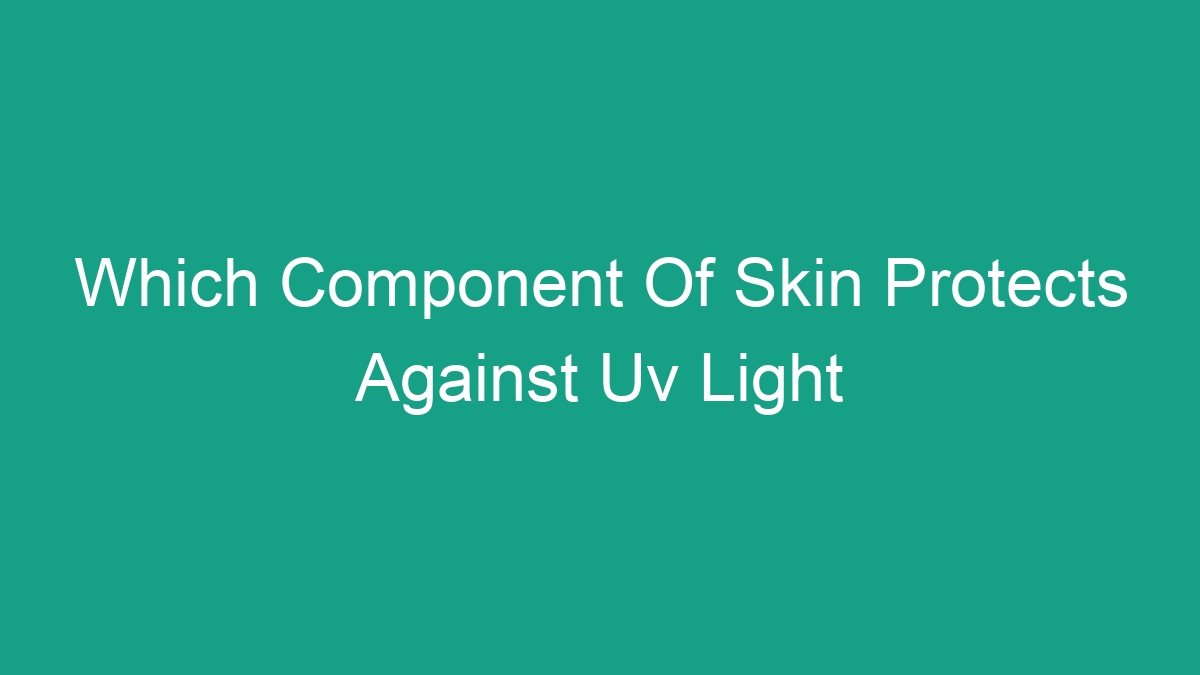
The Epidermis: The First Line of Defense
The epidermis is the outermost layer of the skin, and it plays a crucial role in protecting the body against UV light. Melanin, a pigment produced by specialized cells called melanocytes, is the primary component of the epidermis that provides protection against UV radiation. Melanin acts as a natural sunscreen, absorbing and dissipating UV light to prevent it from penetrating deeper into the skin.
There are two main types of melanin: eumelanin, which is responsible for dark brown to black pigmentation, and pheomelanin, which gives a yellow to red color. The amount and type of melanin in the skin determine an individual’s level of protection against UV radiation.
- Melanin provides protection against both UVA and UVB radiation, which are known to cause skin damage and increase the risk of skin cancer.
- People with higher levels of melanin in their skin have a natural advantage in protecting against UV radiation, but they are still susceptible to sun damage and should take appropriate sun protection measures.
The Stratum Corneum: Barrier Function Against UV Light
The stratum corneum, the outermost layer of the epidermis, acts as a physical barrier against UV light. This layer is composed of dead skin cells (corneocytes) embedded in a lipid matrix, which provides both mechanical strength and protection against environmental factors, including UV radiation.
UV-absorbing compounds such as urocanic acid and trans-urocanic acid, which are naturally present in the stratum corneum, contribute to the skin’s ability to absorb and neutralize UV radiation.
- The thickness and composition of the stratum corneum can vary depending on factors such as age, environmental exposure, and skin type.
- Maintaining the integrity of the stratum corneum through proper skincare, including moisturization and exfoliation, is important for enhancing its UV-protective function.
The Role of Antioxidants in UV Protection
In addition to melanin and the stratum corneum, antioxidants present in the skin play a crucial role in protecting against UV-induced damage. Antioxidants such as vitamins C and E, as well as natural plant extracts like green tea and grape seed extract, help neutralize free radicals generated by UV radiation, thus reducing oxidative stress and DNA damage in the skin.
When applied topically or present in the diet, antioxidants provide supplementary protection against UV-induced skin aging, inflammation, and potentially skin cancer.
- Topical formulations containing antioxidants can complement the skin’s natural defense mechanisms and enhance its ability to combat UV damage.
- Consuming a diet rich in fruits, vegetables, and other sources of antioxidants can also contribute to overall skin health and provide protection against UV-related skin concerns.
Conclusion
In conclusion, the skin’s protection against UV light is attributed to a combination of its inherent components, including melanin in the epidermis, the UV-absorbing properties of the stratum corneum, and the role of antioxidants in reducing UV-induced damage. Understanding the interplay of these elements and taking proactive measures to support the skin’s natural defense mechanisms are essential for maintaining healthy and resilient skin in the face of UV radiation.
FAQs
1. Can sunscreen replace the skin’s natural UV protection?
Sunscreen serves as an additional measure to protect the skin from UV radiation, but it does not entirely replace the skin’s natural protection mechanisms. Sunscreen should be used in conjunction with other sun protection strategies, including seeking shade, wearing protective clothing, and avoiding peak sun exposure hours.
2. Are all skin types equally protected against UV light?
No, individuals with darker skin tones typically have higher levels of melanin, providing them with a natural advantage in protecting against UV radiation compared to those with lighter skin tones. However, regardless of skin type, everyone is at risk of UV-induced damage and should take appropriate sun protection measures.
3. How do antioxidants contribute to UV protection?
Antioxidants help mitigate the damaging effects of UV radiation by neutralizing free radicals and reducing oxidative stress in the skin. When used topically or consumed through the diet, antioxidants provide supplementary protection against UV-induced skin aging, inflammation, and DNA damage.



